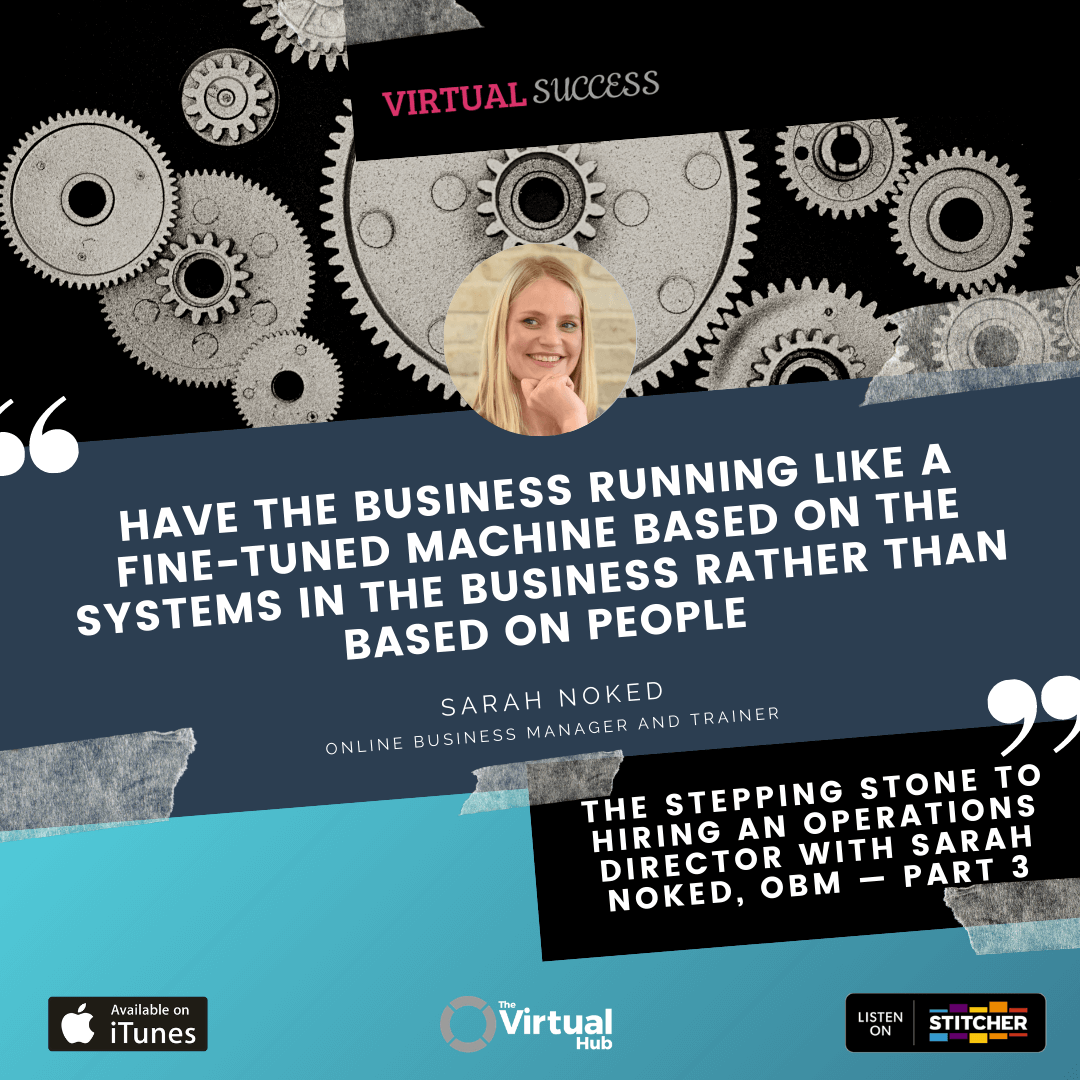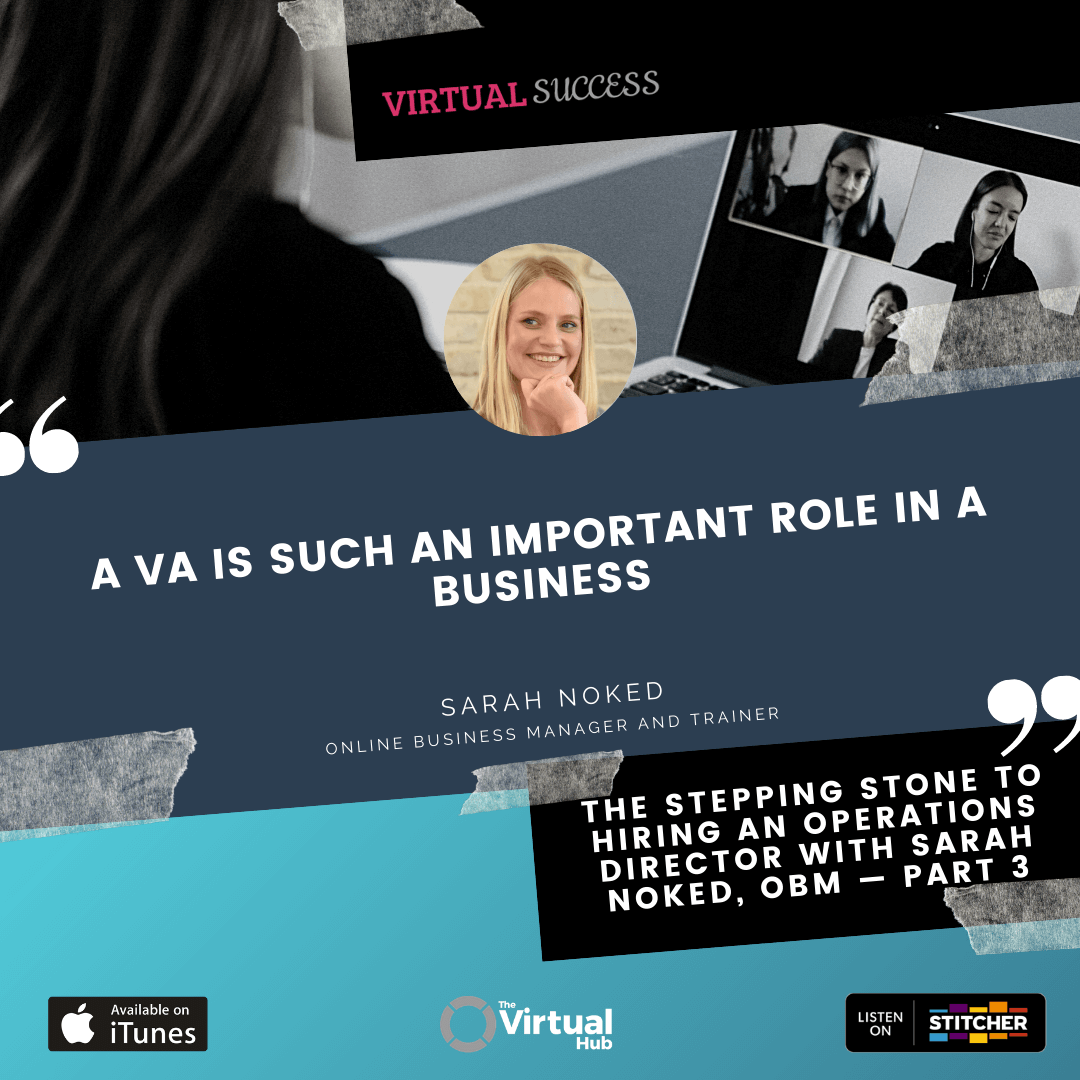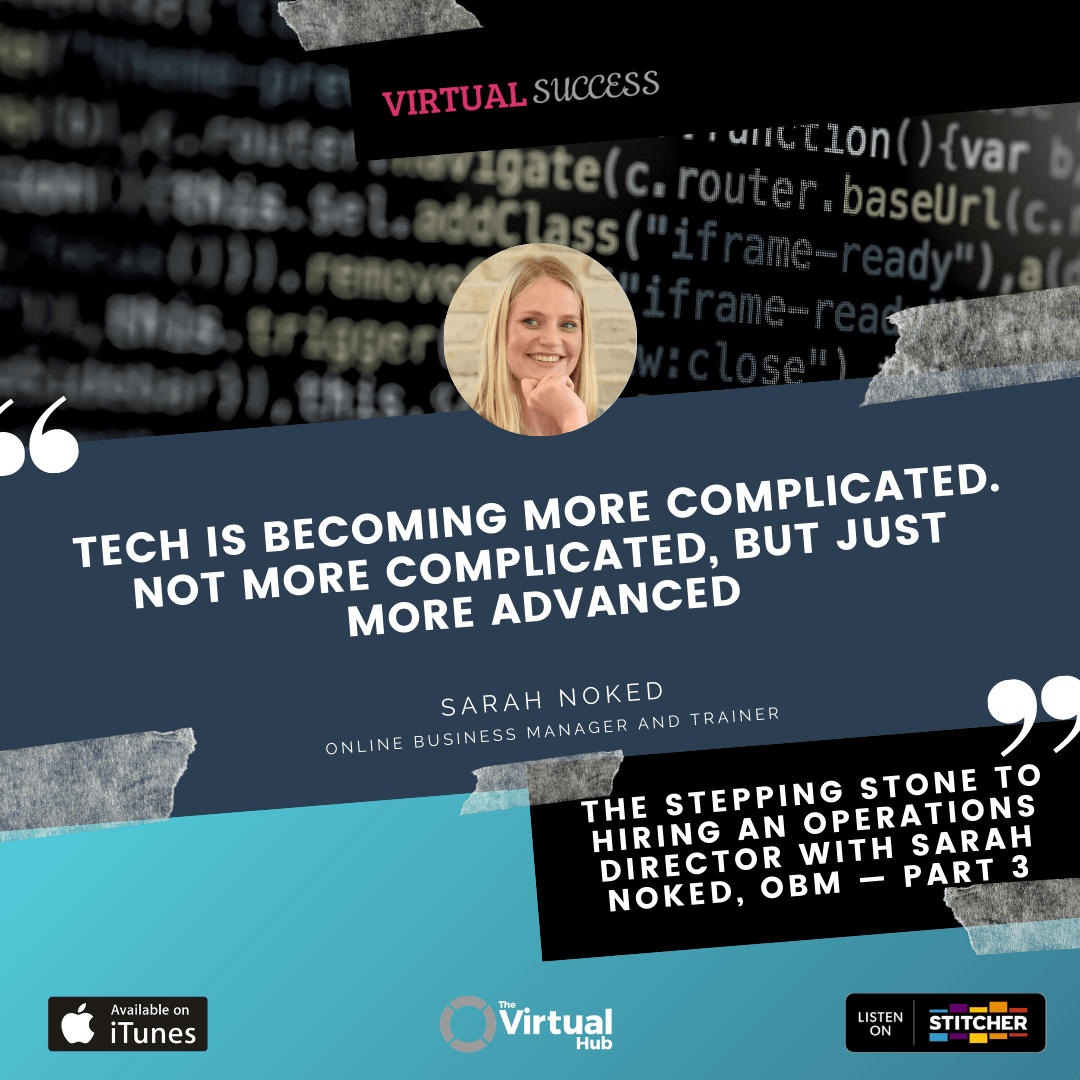The Stepping Stone to Hiring an Operations Director with Sarah Noked, OBM — Part 3
Want the transcript? Download it here.
During this episode, we take a closer look at the role of an Online Business Manager and whether this a seat you want to be filling in your own business.
Some of the areas covered include:
- Understanding the role of an Online Business Manager (OBM)
- The key differences between what a VA does and what an OBM does
- When you should consider bringing in an OBM to help you grow your online business
- Knowing when to replace an OBM with an Operations Manager
Let us know what your key takeout has been from this episode and join the continuing conversation over in the Virtual Success Facebook Group.
This episode is the last part of a 3-episode series. You can listen to the previous parts here:
- Part 1: Do I need a VA, Project Manager or Operations Manager…or all three?
- Part 2: Right People, Right Seats, Right Time
In this episode:
02:12 – What is an Online Business Manager?
04:58 – The difference between VAs and OBMs
06:56 – When you should consider bringing in an OBM?
09:25 – OBM versus having someone physically working next to me
11:26 – Online presence vs. offline presence
13:28 – Knowing when to replace and OBM with an Operations Manager
15:05 – Choosing the right team member for the right stage of business
19:19 – Having team members play to their genius
20:50 – Sarah’s Top 3 Tips
24:00 – Wrapping things up
Barbara: Hey, everyone and welcome back to another episode of the Virtual Success Show where I’m joined by my co-host, Matt Malouf. Hey, Matt, how’s it going?
Matt: I’m excellent, Barb, and yourself?
Barbara: I’m good, thanks. I’m good, thanks. I’m trialling out a new space today in Sydney. I’m at the beautiful WeWork Co-Working Space in Sydney recording this podcast.
Matt: Very cool. Very cool.
Barbara: For today’s show, guys, we’re going to do the third in a three-part series that Matt and I are quite excited about. The three-part series where we talk about VA versus project manager versus operations directions, or more of an operations manager. The first show we did, it’s worthwhile listing to that, where we dissected each of those roles and where they fit in your business. In the second part of this three part series we looked at getting the right people in the right seats on the right bus. Sometimes you got the right people, but they might be in the wrong seats and that can destabilise things. Often you see people just getting rid of staff rather than just figuring out whether that is the issue. In this third part we really want to get into this operations project manager piece.
Barbara: I’ve brought on a very good friend of mine and someone who helps me out a lot in my business too, Sarah Noked, who is a certified online business manager and trainer. She’s one of only three people in the whole world who is actually able to train people to be online business managers. She runs an amazing agency of OBMs from Tel Aviv and she’s joining us today, very early in the morning, from Tel Aviv. Hey, Sarah. How’s it going?
Sarah: Hey, I’m fabulous. Thanks for having me on.
What is an Online Business Manager?
Barbara: You’re very welcome. Look, Sarah, to kick things off, can we just talk about … You run OBMs which are online business managers. Let’s just explain to the listeners, break it down, what is an online business manager? What’s the sort of definition there?
Sarah: Mm-hmm (affirmative). Mm-hmm (affirmative). Yeah, a great question that I get asked quite often. Basically, an online business manager deals with the management piece of an online business. Project management, people management, operations management, and resources management. You’ll often find an OBM in the place working alongside the business owner where the business owner comes to the table with the “what”. You know, what is it, what’s the strategy behind the business, what are the products that we’re selling, what is our “why”, basically. The OBM comes with the “how”. How are we going to implement this, what team members do we need, what strategies or tools do we need to build out, and then they will work together with a business owner and the team to make sure that the day-to-day operations run really smooth, make sure that projects run smooth, and that the team is happy, basically, on a lot of levels.
Barbara: Wow. Yeah, and what about… You guys build out processes as well
Sarah: Mm-hmm (affirmative). Yeah, we’re—
Barbara: …owners hate doing.
Sarah: I know. I don’t know what it is. It’s so funny. I love systems. I’ve always built out systems for things. I feel like, “Well, doesn’t everybody love this?” In my years as working as an OBM I’ve realised that that is really not the case. Our agency specifically specialises in systems, and generally speaking as somebody who certifies OBMs, there is a degree of systems creations and systems management because the idea is to have the business running like a fine-tuned machine based on the systems in the business rather than based on people.

If you’re an online business owner and you have a blog or a podcast and you have a virtual assistant who comes on the team and is the one responsible for manage… Not for managing but for carrying out the tasks, and then that person leaves and you’re like… The online business owner’s like, “Well, I don’t even know what she was doing, and we’ve got no system for this, and now we’re basically building it again.” An OBM in that case, as part of the team management would work with the VA or alone and set up systems so that when people, which happens… I know you guys have talked about this too, on the podcast… People leave and you need to have a system set up so that someone can come right in there and seamlessly carry on.
The difference between VAs and OBMs?
Barbara: I’m interested here now, in your view, because I know you see this a lot as well. Some clients come to us and they want all these systems and processes and they hire a VA, and that’s great. Our VAs can take people a long way in this path, but where’s the line for you between the whole VA thing and then online business manager…
Sarah: Yes.
Barbara: … and where do people get confused?
Sarah: Yeah, so generally speaking, an OBM would not come onto a team if there was no VA on the team. Basically, a VA … It’s the implementer, the doer role, so it doesn’t necessarily need to be a VA. It could be like a tech support or a developer, but generally speaking it is a virtual assistant who is in the seat of implementing and doing, whereas the OBM is more in the role of managing and having an oversight to make sure that that gets done. An OBM is very much a big picture thinker, and usually comes on the scene when a client is really mentally and emotionally ready to kind of hand over the reins of what is the management day-to-day.
When it comes to who else is on the team, an OBM wouldn’t be on a team with just the business owner. There has to be somebody there who can implement. Often times, when I come on a team as an OBM working in the OBM role, I might be the doer of a task for 60 days, for example, in order to make sure that that task runs smoothly, that it works well in the grand scheme of the big picture of the business. Then, once that’s done and buttoned up, then I would pass that along to the VA to further carry on the recurring, repetitive task of completing that.
When you should consider bringing in an OBM?
Matt: What are some of the easy identifiers for our listeners on whether an OBM is right for them or they should be considering one?
Sarah: Mm-hmm (affirmative). Yeah, that’s a great point. First off, because as someone who’s been an online business owner for going on almost seven years, I think the first piece is: do you have a proven business model? Is your business something that is clearly making money? You’re able to recreate success, meaning if you’re selling a product it doesn’t just sell once and then that’s the end of it, but something you’re selling your services or you’re selling an online product over and over again. Definitely a proven business success model.
There is a certain revenue that we like to see as online business managers, so I generally say like … I like to give it a figure. I’m a really straight up kind of gal, and I say, “If you’re making at least between $5 to $10K US in revenue a month, then you’re likely ready to start to bring on an OBM. Of course, the first person you hire on is likely a VA because these online business owners will be the OBMs of their own business until the revenue is where it needs to be and the team members … There needs to be something to manage, right? It’s sort of like, “Is there a business to manage? Is there a team to manage? What is really happening on the operations?”
The idea for us, really, at the end of the day is to take the day-to-day project and people management off of our client’s plates so that they can really focus on growing the business in terms of the creative aspects. What products can I create? What clients do I need to schmooze? More of that stuff. We’re freeing up their time by taking over the team management so they can actually do what they are good at. Not all of them are great project managers or operations managers.
Matt: Most of them aren’t, in my experience.
Sarah: That’s right. That’s right.
Matt: The reality is not many of us got into business to be project managers. We got into…
Sarah: Exactly.
Matt: … what you just talked about.
Sarah: Yeah. Exactly.
OBM versus having someone physically working next to me
Matt: Okay, so we’ve identified I’ve got a business and a model that’s working. Obviously then I’m probably quite busy and I’m looking for somebody to come in and take over all of those tasks you’re talking about and projects. How would I decipher between an online business manager or maybe having someone come into an office working next to me?
Sarah: I think it really depends on you as the business owner. I would say most of my clients don’t actually have a physical office, so that would be the first thing. They work from home. I think if you’re at the point where you’re sitting in a physical office and want to build out a business that is more offline in a sense… Our clients are building empires online from their homes. A lot of them, part of their ‘why’ of having the business is their taking care of their kids or they’re a caregiver or they want to have the flexibility to travel.
I don’t really come across clients who… I would say then you probably need to look at hiring maybe a part or full time employee. Generally, online business managers, like virtual assistants, are contractors. Do you want to hire a contractor or do you want to have an employee coming in? For the record, all of my OBMs here in Tel Aviv are all employees and we all work remotely. Of course, we do have days where we try to get together once a month for team morale and all of that stuff. You generally wouldn’t have an OBM working in the office.
Online presence vs. offline presence
Barbara: Is it really for online? So, the OBM thing. Let’s talk about the difference then between an online business manager, the OBM thing, and then getting an operations director or a chief operating officer type role into a larger business that maybe could have a large online presence but also has a large offline presence? Where would you draw the line there? How would you describe that?
Sarah: Again, I think, for me, it comes back to a revenue thing in a lot of ways. If a business is generating more than $2 million in revenue… I speak in US dollars. Most of my clients are… Well, I have a lot of clients in Australia too, but… I would say that if your business is making over $2 million, you probably do need to look at bringing in an operations manager in the employee sense. That person might have started off as an online business manager that moved into a more… I think as the business grows the OBM kind of comes in when the business is at a very sensitive point of growth. Maybe before the business owner can really afford to have consistent employees and salaries and all of that.
Barbara: … ’cause I love this because it’s actually a bit of a stepping stone, which I didn’t realise.
Sarah: Mm-hmm (affirmative). Yes.
Barbara: It’s more like if somebody’s not quite ready yet to have their own operations manager, but they’re struggling with… They’ve got the VA, but they’re finding that… Does the managing the people. They haven’t really built out their processes as effective—
Sarah: And they don’t even want to.
Barbara: …and they’re in that kind of crevice, I suppose, and they…is to think about something like what you guys are offering… business manager type role to get you over that hump of that initial set-up stage.
Knowing when to replace and OBM with an Operations Manager
Sarah: That is exactly it, Barb. It’s funny, because as an OBM my success comes when I can off-board myself from a client’s business and replace myself with a full or part-time employee to take over that operations role or the project role or the team role. Sometimes it takes a couple different team members to replace us. Usually that’s the case. Because the business is bigger, there’s more revenue, there’s more products, there’s more team to manage. Yeah. That’s success for us. Yes.
Barbara: I see.
Sarah: I actually had that. We have it quite often and I just recently, for example, off-boarded myself from a client I had been working with for two years. This is a woman who makes more than a million in revenue in her online business. She’s a coach. It was a joyous occasion when I was able to bring on a full-time employee to replace me and take over managing. I had the system set up. We were using TeamworkPM. I know you guys are Asana fans. Whatever. Everything was done.
Barbara: … anything project manager.
Sarah: Yeah. Yeah, exactly. Everything is done. Everything was like, here’s… I rolled out that red carpet for that person to waltz in and take over the reins. It was a good day for both me and the client because I was ready to take on a new project and she was ready to take on employees, which was cool.
Matt: I think this is…
Barbara: Go ahead. I’m sorry.
Choosing the right team member for the right stage of business
Matt: …a really important point for listeners is that it’s choosing the right team member for the right stage of business. What Sarah was just talking to there is she was invited in, probably when the business was a lot less than a million dollars in turnover. Builds up, fulfills her role, and then, effectively, almost makes that particular role redundant because it’s reached its expiry date within the business and needs someone new. The reason I think this is a really important point for listeners is I think that too often we hold onto people too long, and we don’t allow our people and systems to grow with the business. I think that’s just a really important point you’ve highlighted.
Barbara: Yeah, that’s excellent. It actually brings us back, Matt, to the second show that we did in this three-part series is that whole thing of right people, right bus… Right people, right seats, right bus, at the right time and as your business does grow… I think this is a really interesting space because I think a lot of people don’t realise this exists out there and they need that stepping stone actually to going from VA to potentially team of VAs. Then not getting stuck in that crevice because you think you can’t afford to hire an operations director, which would be eventually that you would move to that level. This is like your big stepping stone, which is great for so many businesses.
Sarah: It really is. I think it’s true; a lot of people don’t know that we exist or that … It is a virtual support role and in a lot of ways we get categorised under the virtual assistant greater umbrella term as a type of person that can come in and do these things. I did my own sales calls for my agency for years, and most of the people that come in are beside themselves with stress and overwhelmed because they have a few VAs or a few team members, and they’ve kind of put off or ignored or maybe felt like, “Well, you know, I’m an okay project manager,” or “I can’t handle the operations,” or “I don’t want to pay somebody to do all of this,” but they’re literally spinning their wheels. Burnt out. Their customers aren’t happy because they’re not given enough attention. The business owner, quite frankly, doesn’t have time for every last thing.

Barbara: I think, I see it on my side and I know, Matt, you would see this as well when you’re coaching, but we see is that somebody gets a few VAs through us. They’re all excited in the beginning and it goes great. Then they try to elevate the VA into this role, because they’ve got a great VA that is exceptional and may progress into that kind of a role. What they do is they promote them into this sort of a role and overnight expect them to be able to take that on, but it’s actually a totally different … It’s a whole other level to being a VA.
Sarah: Yeah, it totally is.
Matt: It’s actually a different mindset and skillset. Sorry to cut you off.
Sarah: Yeah, no. Totally. Absolutely. It is a different skill and mindset. I think, a lot of the time, these business owners expect that the VA will continue to be the implementer or the doer on the team in addition to project management. I think one of the things as business owners that you really have to be attuned to is, you can’t be the big picture thinker… You can’t be in the OBM role, helping the client with the strategy, and helping the client carry out the ‘what’ in their business by managing. You can’t be in the day-to-day and have the big picture in mind. It’s hard. A lot of the time, because I see it all the time on my teams, is the VAs are still very much in that mentality of doing. A VA is such an important role in a business. You need to have somebody that’s strong with the implementation and strong with the tech skill and strong with what it is that they’re doing. A lot of the times it just doesn’t translate over.
Barbara: Yeah, Matt, what would you see? You would see this in coaching businesses as well. Major gaps when you’re trying to get strategy through and there’s gaps in the team.
Having team members play to their genius
Matt: Absolutely, and it comes back to that second show in this series. It’s putting the right people in the right seats and getting them doing the right things. I talk to it in my book, The Stop Doing List, this about playing to your genius. Doing the things you love, the things you’re really good at and that are profitable. I think too often we try and get people to do things that they’re not very good at or don’t have the right skillset or desire to learn the skills. The third thing is it actually needs to be done now and can’t afford the time for somebody to learn the new skills. All it does is create frustration and stress, rather than choosing the right person and putting them in the right seat. I think it makes a huge difference.
Barbara: Yeah, and I think the promoting somebody as well. I’ve seen a lot of our clients in particular really want to promote their VAs. I think what we’ve got to recognise there is while that is great… I love to see that happen because, obviously it’s career development for our VAs. But you’re almost taking on a whole new role for yourself again. You’ve got to mentor that person and train them up into this new position. It might be worthwhile looking at what an online business manager… To even work alongside that VA and then, as you say, Sarah, when the business eventually graduates off you guys, there could be a role for that VA to maybe step up into or play a bigger role eventually. But the truth is, there’s a lot involved.
Sarah: Oh, yeah. Absolutely.
Sarah’s Top 3 Tips
Barbara: It’s a whole other role. Sarah, what are the sort of final … The top three tips that you would give to anyone who’s in this wheel-spinning, has a few VAs… What are your sort of top three…
Sarah: Yeah, well that’s juicy. Top three I would say recognising that it’s a mindset shift. As a business owner you really have to be prepared to kind of explore what it would mean to step out of that day-to-day. I think a lot of us as online business owners, we hold onto the control. Tip one is get ready to relinquish the control.
Tip two would be, you definitely need to have other team members. It’s very, very rare that my team will come in and support an online business owner or any business owner if there aren’t any team members. It just isn’t good for anybody and the roles get very skewed. The tip is that you need to bring on a VA, ideally, or have somebody in the implementation role. If we were to come on a team like that, and we do, it’s just about coming in with the expectation that, “Okay, in the next 60 days we’re hiring a VA.” Tip two is know that there has to be other team members. There will be other team members.
I think tip three is just really you have to have enough revenue in order to bring on this kind of role. If a client is making anywhere between $5 to $40 or $50K a month, that’s kind of the sweet spot for an OBM. Is your revenue where it needs to be and are you making consistent revenue?
Barbara: Yeah, that’s a very good point. I think if somebody isn’t making that kind of revenue you’re still in the stage where there’s a lot of doing to be done by yourself and you may just have to cope with the VA.
Sarah: That’s right.
Barbara: online business manager.
Sarah: You have to be that project manager, OBM. You have to be that role.
Barbara: I guess, unless you’ve got money to invest. Like maybe—
Sarah: Exactly.
Barbara: …want to invest the money.
Sarah: Yes.
Barbara: Some people do that.
Sarah: Yes. Some people do do that. I think they’re in the mindset for like, “I’m ready to scale. I’m ready to elevate. I know that this is going to work” kind of thing.
Barbara: Yeah.
Sarah: We have come across clients like that, but it’s always kind of that tricky situation. There are certain requirements that we have. Also, as OBMs, we tend to be on a team for sometimes six months, sometimes two years. It’s usually around two or three years where maybe it sort of gets stale after a while and the business kind of needs to grow a little bit more. Generally speaking, business owners have to do it themselves if their revenue isn’t where it needs to be, with the VA.
Wrapping things up
Barbara: Yeah. Any final questions from you, Matt?
Matt: No, all good. It’s been fantastic.
Sarah: Yeah, it’s been such a pleasure talking to you guys.
Barbara: I really feel this is an under… I just think this is an area that people are not aware of out there. It’s like years ago when nobody knew what a VA was. It’s like this is kind of the next thing. A lot of people don’t know that this stepping stone is out there, so I think this is a valuable show.
Sarah: Yeah, one of the things that, just to sort of speak to that, I think in the last five years — I know I’ve noticed this; I’m sure you guys have too — there has been so many changes and you can no longer have that one size fits all team member that can be the unicorn and do everything. Tech is becoming more complicated. Not more complicated, but just more advanced. You know, online tools are more sophisticated. Online businesses are more sophisticated and there’s no really a ‘one team member fits all’ kind of role that used to be okay five years ago. Now, people are up-levelling. People want more. There’s more virtual teams and all of that comes along with that.

Barbara: If people want to connect with you, find out more, they want to talk to you guys about maybe how an OBM would work in their business where should they go?
Sarah: Yeah, they can head on over to sarahnoked.com. S-A-R-A-H-N-O-K-E-D.com and they can book a free consultation with us. I’ll straight up will tell them if it’s a good place or not, because as OBMs we need to make sure that the business can actually support us. Otherwise, it just makes for not a comfortable situation. Usually, I’ll send them your ways.
Barbara: Of course, I know there’s going to be some people listening might actually like the idea of becoming an OBM…
Sarah: Yes.
Barbara: …something that you, you’ve got another business…
Sarah: Yes.
Barbara: …that actually trains people in that, so where should anyone go if they want—
Sarah: They can head on over to the website as well, or to even obmcertification.com and see the whole program there.
Barbara: Brilliant. That’s great. Thanks so much for today. I know the listeners are going to get loads out of this. Guys, if you are getting a lot out of this show, please give us a rating and a review over on iTunes. We would love it, because it helps us to get the show out to more people and help more people. Also, if there’s a show that you want us to cover, an idea, pop into the Facebook group, The Virtual Success Show on Facebook and let us know what kind of show that you would like to do.
Barbara: Thanks, Sarah. Thanks, Matt. Thanks, everyone for today.
Sarah: Thanks Barb and Matt.
Matt: Thank you.
The Hosts
 Matt Malouf
Matt Malouf
Matt Malouf is a passionate business coach, speaker, author, and entrepreneur on a mission to help entrepreneurs around the world break the shackles of mediocrity and reach new levels of personal and business success.
 Barbara Turley
Barbara Turley
Barbara Turley is the Founder & CEO of The Virtual Hub, a company that specializes in recruiting, training, and managing superstar ‘Virtual Assistants’ in the social media, digital marketing, and systems automation space.
